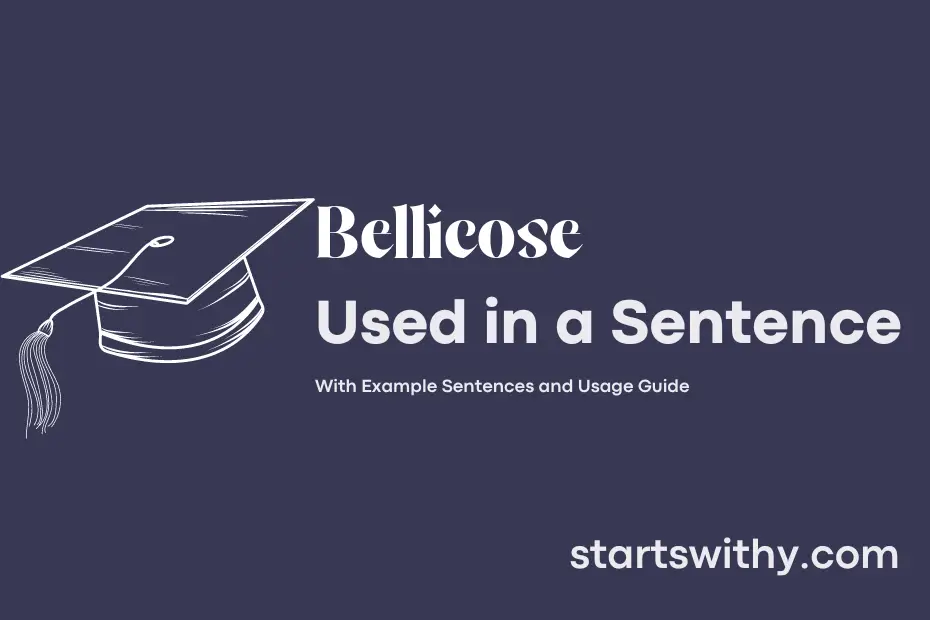Have you ever encountered someone who is constantly aggressive and inclined to start arguments or fights? This type of behavior can be described as bellicose.
The term “bellicose” refers to a combative or warlike nature, often characterized by a tendency to engage in hostile or confrontational interactions.
7 Examples Of Bellicose Used In a Sentence For Kids
- Some people can be bellicose when they are angry.
- It’s important to stay calm and not be bellicose when solving problems.
- Let’s remember to use kind words and not be bellicose to others.
- Being bellicose can hurt someone’s feelings.
- We should always try to talk things out peacefully, instead of being bellicose.
- It’s nice to be friendly and not bellicose to our friends.
- Hitting or pushing others is a form of being bellicose behavior.
14 Sentences with Bellicose Examples
- During heated debates in a college political science class, some students tend to become bellicose in their arguments.
- The rivalry between two sports teams on campus often leads to bellicose behavior among their supporters.
- Some students prefer to avoid bellicose discussions in the classroom and focus on maintaining a peaceful environment.
- The competitive nature of college exams can sometimes bring out a bellicose attitude in students.
- Group projects can sometimes lead to bellicose interactions among team members who have conflicting opinions.
- Late-night study sessions can make even the calmest student feel bellicose.
- The pressure of upcoming deadlines can cause students to exhibit bellicose behavior towards their peers.
- Networking events and job fairs often require students to be assertive without coming across as bellicose.
- It’s important for college students to learn how to navigate bellicose situations diplomatically to maintain positive relationships.
- The intense competition for internships can sometimes bring out a bellicose side in students striving for the same position.
- Standing up for one’s beliefs without being bellicose is a valuable skill that college students can develop through practice.
- Campus protests can quickly escalate if bellicose individuals become involved, leading to potential conflicts.
- Proper conflict resolution techniques can help prevent bellicose confrontations during group projects or study sessions.
- In a diverse college environment, it’s essential to respect different opinions and avoid bellicose reactions to differing viewpoints.
How To Use Bellicose in Sentences?
To Bellicose means to demonstrate aggression or a willingness to fight. When using this word in a sentence, it is important to consider the context and tone in which you want to convey a sense of hostility or combativeness.
Here are some tips on how to use Bellicose in a sentence:
-
Choose the right context: Use Bellicose when describing a person, attitude, or situation that is characterized by aggression or a readiness to fight. For example, “The bellicose tone of his speech alarmed the audience.”
-
Use descriptive language: When incorporating Bellicose into a sentence, consider using adjectives or adverbs that amplify the sense of hostility or combativeness. For instance, “The soldier’s bellicose demeanor made it clear he was ready for battle.”
-
Be mindful of the tone: Since Bellicose has a negative connotation, make sure the context of your sentence aligns with the intended meaning. Avoid using it in situations where a more neutral or positive word would be appropriate.
By following these tips, you can effectively incorporate Bellicose into your writing and communication to convey a sense of aggression or readiness for conflict. Remember to consider the context and tone to ensure your message is clear and impactful.
Conclusion
In conclusion, the use of bellicose language can escalate conflicts and contribute to hostile situations. When individuals or leaders resort to bellicose rhetoric, the potential for misunderstandings and violence increases, hindering the possibility of peaceful resolutions. By adopting a more diplomatic and constructive approach to communication, parties can foster understanding and cooperation, leading to more productive outcomes.
It is crucial to be mindful of the impact of bellicose sentences and choose words carefully to promote harmony and avoid provocation. By promoting a discourse that prioritizes mutual respect and dialogue, conflicts can be de-escalated, and solutions can be sought through peaceful means. Ultimately, the power of language in shaping interactions cannot be underestimated, and by using words that are conciliatory rather than confrontational, we can strive towards a more peaceful and harmonious coexistence.



